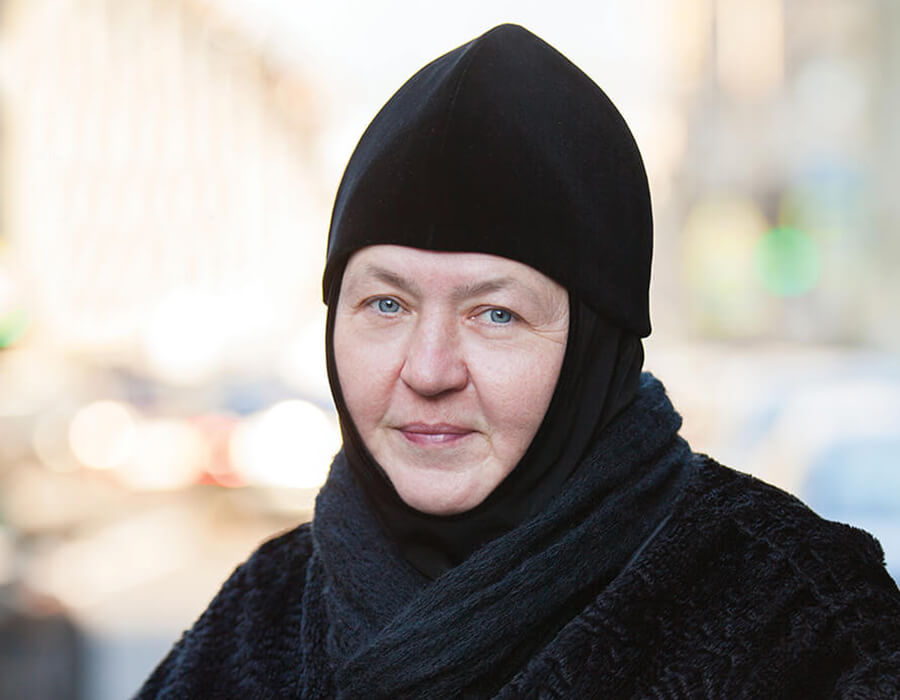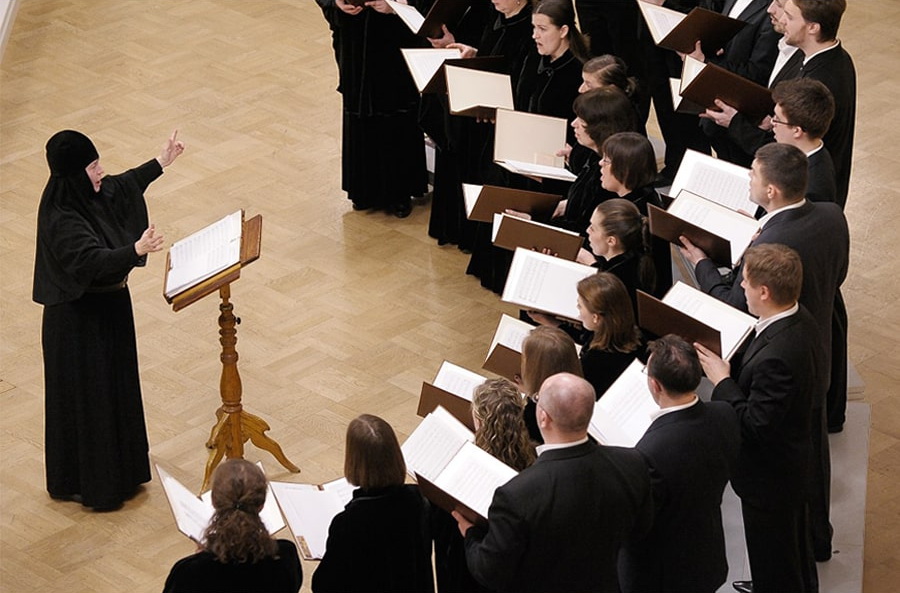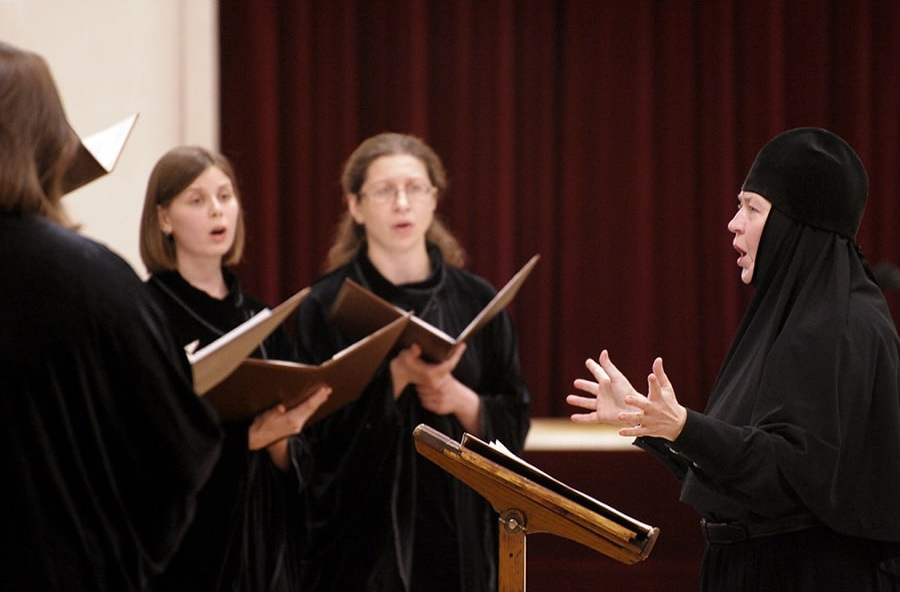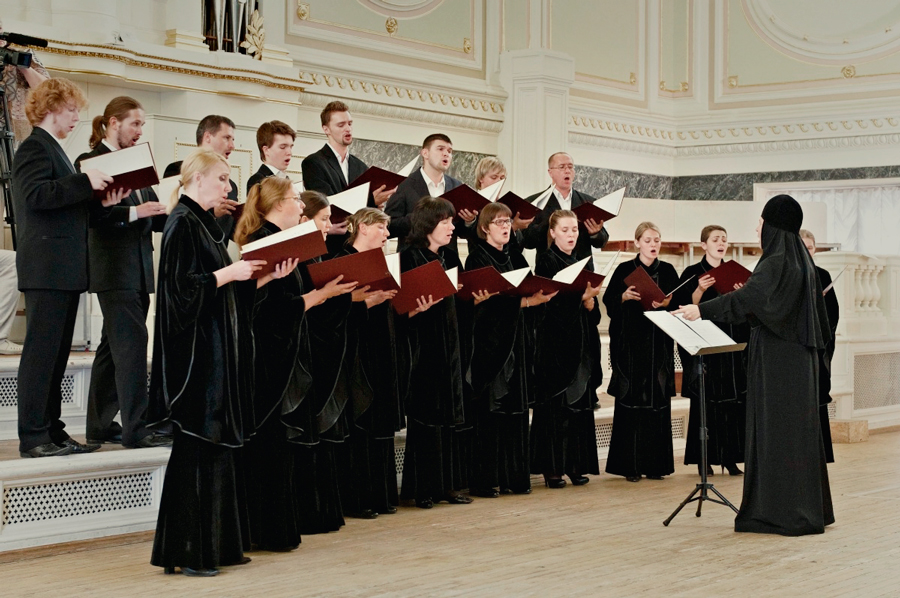
Your musical talent has many facets - you are a choir conductor and composer of church music and spiritual chants. Your works are known in Belarus and beyond. You have a degree in music from the Leningrad Conservatory, and many years of experience in teaching music. What impact has your spiritual life at church, and your monastic life the Convent had on your growth as a musician?
I have occupied myself with church music for 26 years, and I can name several milestones in my development as a musician during this time.
My coming to church was the first. It opened a whole new world for me. I embraced into my life and works liturgical texts, prayer services. I learned about the Orthodox saints and learned to talk to them in the language of music.
As a novice at church, I thought that its musical tradition was immutable, and there was little that I could add. All I needed to do was to follow the established canon. But as I discovered later, the Church gives a musician a lot of freedom for creativity. I appreciated the great variety of Church music and familiarised myself closely with the legacy of the great church composers and conductors of the past - Chesnokov, Archangelsky and Bortnyansky, among others. I was impressed by their distinct musical styles and approaches.

It took me some time, however, to begin to write church music. I could just not muster enough confidence and courage to begin. I was just too afraid that I was not ready because I had not been there long enough. At one point, the precentor of my choir asked me to write the music for the Kontakion of the Akathist to the Protection of the Theotokos. This was the first piece of church music that I wrote. It was included, along with my other chants, in the album "Heartfelt singing", produced by the Convent of Saint Elisabeth before I joined it as a monastic. Eventually, I wrote adaptations and harmonisations for all the hymns that we sing today at our liturgy.
"Of Thy Mystical Supper" (Znamenny chant) by The Festive Choir of St Elisabeth Convent
Another major turning point was joining the Convent as a monastic and taking tonsure. To me, becoming a monastic was a way to overcome the stagnation in my spiritual growth and spiritual burnout. Both manifested themselves in a sense of inner rebellion and protest; being tempted to cry out, silently, to all the rest, "I have faith in God, and I am not interested in what you think about me."
As a monastic, I took an interest in writing music anonymously and found it very rewarding. I wrote harmonisations of the chants by adapting the traditional Znamenny and Byzantine chants, on which all the other ones - such as old Bulgarian or Valaam chants - are based. I was excited about this work.
I also wrote and harmonised spiritual songs. In the beginning, I was reluctant. I thought that my calling as a monastic was to pray to God and not allow myself to take liberties with music. Eventually, as my interest grew, I came to understand its this work was making great sense. Songwriting is a way to reach out to many people. Orthodox or non-Orthodox, Christians or non-Christians all of them need a spiritual component to their daily lives and travels. In response to this felt need, we created a series of albums titled "Music for life and travel". We recorded two albums with the monastic sisters' choir, and another two with the festive choir. We launched them into the wide world.

As a monastic, I also felt a strong calling for spiritual unity in singing - something that the Orthodox call Sobornost. Sobornost is about community, the sense of belonging, oneness with Christ, and partaking in the worship and communion. I came to see Sobornost as paramount to the singing. One choir, many people. A multitude in oneness. All of these are essential for the joint, communal prayer that takes place at Church.
How would you explain the meaning and purpose of your service as a musician at church today?
Without the listener, music is nothing but a set of notes on a page. We play music for the listener. I can play it for myself, and I will be the listener. If I perform in front of you and me, I do so for an audience. Any piece of music, like any artistic expression, exists to benefit the people.
What would 'benefiting the people' mean in the context of church music? In the New Jerusalem, angels are singing everywhere. The singing at church reminds us of the angelic singing. In Orthodox worship, no service takes place without the singing. Even the reading is done in a singing voice. The choir, the singing, the music and the text are all of great importance. The work of a musician benefits the audience to the extent that it brings the listener closer to oneness with God and eternal life in Him. This is a heavy responsibility. A skilled musician has a wealth of expressive means at their disposal. A musician must use them as fully as possible, and make sure that they are congruent with the high meaning and purpose of his art. Secular music is often sensuous, sometimes to the point of being crass and vulgar. Succumbing to momentary emotions may undermine the harmony of the ends and means on the music. Exercising restraint is essential in many situations. Still, as humans, we cannot, and must not be free from emotions. Yet we should always hold ourselves to a high standard in the way we feel and express them.

An artist must also use his talent altruistically without appropriating it. This can be a great challenge. When your music or chants are enjoyed by thousands or even tens of thousands, it is easy to become proud and conceited. Resisting this temptation is difficult. But if you do not, your music will suffer, as your means will no longer match the ends.
How can you tell from the reaction of your audience that you are doing everything right? What kind of response in the hearts and minds of the listeners do you hope for?
There are many ways for me to know that my music resonates in people's hearts. Some non-believers converted and went to church after hearing the performance of my choir. Some were planning to train for a secular profession, but changed their minds and went to a seminary instead. There are many more examples like this that I do not even know of or remember. - I know that my music has left a trace when I hear it sung in other cities and countries. I was impressed recently by the performance of the spiritual song "No more than this" by a youth choir from a Protestant church in Los Angeles.
Another obvious sign that music has touched the heart are tears. Touching somebody's heart is very hard. Sometimes, tears may come during prayer. Orthodox saints and scholars have written a lot about the tearful prayer. Elders, hermits and ascetics desired it and considered it a great spiritual achievement. It would be wonderful if people would respond to music and singing with this kind of prayer.
Is appreciation of church music something that can be taught? If so, what can a singer, composer or precentor do to engender in people a taste for this kind of music and teach them to love it?
In a nutshell, being sincere and genuine is the key. These are the things that make people want to listen to you. They want to see you put all your heart into your music. This kind of singing would be impossible without having deep faith. No-one would take you seriously if you do not have the faith. You can certainly approach it professionally, and treat it as your job. Work under cover of your professionalism, to quote a trite phrase from police stories. In the past, our festive choir used to face this risk. But it was a professional choir from the beginning, and its singers were taking God seriously. I am confident that the people on the church floor could hear well.

Even when the singing is imperfect from a musical perspective, it can still reach people's hearts if it is genuine and done with deep faith. When I just began to sing at church, I joined a parish choir with amateur singers. Only three of its members had studied music. The rest were from a variety of non-musical backgrounds. Yet I remember my time with this choir as perhaps the best years of my career.
At times, I began to notice that the choir was singing out of tune, and I cringed every time they did that. Sometimes, when I could not bear it any more, I stormed out and cried at the door thinking how terrible the cherubic hymn sounded today' But people would come up to me after the liturgy and say, 'thank you for the wonderful singing!' They did not hear the choir singing out of tune. They heard something else!
As I attended rural worship services later and heard imperfections in the singing of the choir, I was not bothered in the least. I knew that the people were doing their best. Their singing was natural and spontaneous. They sang simple tunes in simple voices, and they were very melodious.
"Rejoice, Virgin Theotokos" (Byzantine chant) by the Festive Choir of St Elisabeth Convent
Our monastic choir receives invitations to sing at prisons and hospitals, and we always accepted them. We have had to stop the practice recently because of the epidemic. I remember our visit to a chapel in prison. It was so tiny - just three by four - and all the prisoners had come. It was very crowded. But the atmosphere was unbelievable. I was moved when a man called Georgy read the Apostle. He read with great expression and piety; one might have thought that he was doing it for the last time in his life.
Yet when people can sing in tune, they should aim to do it. Poor singing by a more or less professional choir means many things. Perhaps its members are not on good terms with each other, or there is no respect between them and the precentor, or the precentor hears the poor singing but does not care. The people will notice this; they will hear the discord in their singing.
Many of our readers have come to like church music, or are beginning to take an interest in it. What would you say to them?
I would advise them to explore the variety in church singing and find something for themselves. The Internet provides a lot of opportunities to do so and many things to choose from. Listen to your hearts - does the singing touch you? Some will be impressed by Aramaic chants, others by the spiritual songs of Father Serafim Bit Haribi, still others will be impressed by the Valaam chants sung by the Brothers' Choir of Saint Elisabeth Convent. Or maybe you will enjoy the choir of Anatoly Grindenko from Moscow; they have been singing old Russian chants since Soviet times. Or you will be touched by the sweet silver voice of Divna Luboevich. Her singing is melodious, elegant and moving.
There are many ways to sing at church. I wish that the music that you will like would touch your heart and resonate in the prayer.
Interviewer: Alexander Piskunov